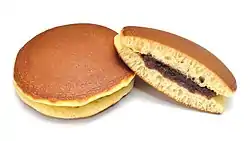銅鑼焼き
Japanese

銅鑼焼き (dorayaki): a whole dorayaki cake.
| Kanji in this term | ||
|---|---|---|
| 銅 | 鑼 | 焼 |
| ど Grade: 5 |
ら Hyōgaiji |
や Grade: 4 |
| Irregular | ||
Etymology
Compound of 銅鑼 (dora, “gong”) + 焼き (yaki, “baking, roasting”, the 連用形 (ren'yōkei, “continuative or stem form”) of verb 焼く yaku, “to bake, to roast”), from the way the shape of the two cake pieces resembles a classical gong.[1][2][3]
Pronunciation
Noun
銅鑼焼き (hiragana どらやき, rōmaji dorayaki)
- a kind of confection consisting of two small cakes baked to resemble gongs, sandwiching a filling of sweet azuki bean paste
References
- 1988, 国語大辞典(新装版) (Kokugo Dai Jiten, Revised Edition) (in Japanese), Tōkyō: Shogakukan
- 2006, 大辞林 (Daijirin), Third Edition (in Japanese), Tōkyō: Sanseidō, →ISBN
- 1995, 大辞泉 (Daijisen) (in Japanese), Tōkyō: Shogakukan, →ISBN
This article is issued from Wiktionary. The text is licensed under Creative Commons - Attribution - Sharealike. Additional terms may apply for the media files.
